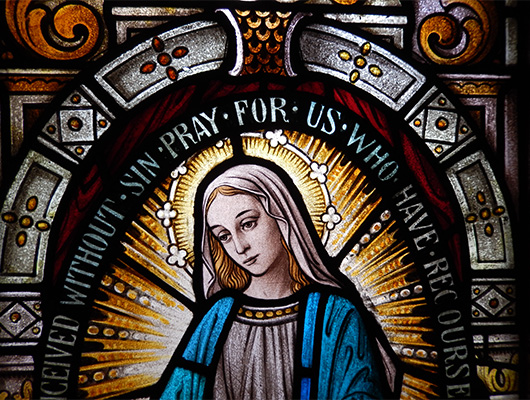童貞的偉大成果(Sacra Virginitas 24-30)
童貞的偉大成果
24如再看一下童貞的豐富成果,則毫無疑惑,其卓越將尤其明顯,「因為從果子可以認出樹來」。(瑪、一二、三三)
(一) 愛德
25一想到自教會初興以迄於今,所有無數的童貞者與宗徒,他們不娶不嫁,以便更充份便利地愛主救人,并繼續發展一度開始的敬主愛人的可奇的工作,吾人便情不自己,感到偉大而甘美的歡樂。當然,吾人無意低估投身公教進行會者對宗教事業所有功績和成果,因為他們以做到司鐸、修士、修女所做不到的;但吾人清昕看到,這種愛德工作大部分仍應歸功與司鐸、修士、修女們。他們慷慨地伴隨著并指導著各年令各階層的人士。幾時,他們因了勞碌或老病而倒下去,則轉託其他人來嗣承其未竟的工作。多次,嬰兒一出世,便為童貞之手所接抱,童貞之手給予嬰兒的撫育不亞於母愛誠摯的生母。及嬰兒稍長,開始運用理智時,童貞者又負責他的教育,以基督的道理和法令指摯他的理智,以適宜的紀律訓練他的心志,陶冶他的資質和脾性。有人患病嗎?童貞者為了基督的聖愛而悉心照應之,并以適宜的醫藥設法恢復并鞏固其健康。有人喪失了父母,遭到厄運,或心神憂戚,或被繫牢獄嗎?決不至無人安慰,無人援助;神職人員、修士、修女要把他們視作基督妙身的肢體,而記起救主的言語:「因為我餓了,你們給了我吃的;的渴了,你們給了我嗑的;我作客,你們收留了我;我赤身裸體,你們給了我穿的;我患病,你們看顧了我;我坐監,你們探望了我......我實在告訴你們:凡你們對我這些最小弟兄中的一個所做的,就是對我做了」(瑪、二五、三五至四O)。至論宣傳天主聖言者,他們遠離祖國,不辭辛苦以歸化教外民眾;還有基督的淨配們,她們對傳教工作,提供極其寶貴的援助;對他們吾人應怎樣稱頌才是呢!吾人向他們全體并每人,重申吾人在「Menti Nostrae」文告里所寫的:「因了獨身的法令,司鐸不唯未曾失掉而且培加增高其為人父的職務,他們不為現世虛幻的生命產育子女,而是為永遠的天上的生命產育子女。」(AAS.XLII,1950,P.663)
(二) 祈禱克苦
26童貞是多產的,不獨因為它使人更專心更便利地舉辦許多外在事業,尤其因了童貞者為愛人所做祈禱以及任勞任勞任怨的忍耐。這是天主的忠僕及基督汙淨配-尤其潛身於隱修院者終身奉行的成全愛德的方式。(24)
(三) 殉道
27奉獻與基督的童貞,其本身便是人對天國所有信德及人對基督所有愛德的表現,無怪乎其聖德的成果異常輝煌。無數獻身宗徒事業的男女童貞以其崇高聖德成為教會的光彩。童貞又使人神力充沛不惜為義致命。從羅馬的依溺斯至瑪利亞高來第,歷史給人提供許多童貞殉道的奇蹟。
(四) 樹立善表
28童貞稱為天神并非無故。聖西彼廉在致童貞女書中說得有理,他說:「我們將來才可能做到的事,妳們現在已開始了;妳們生活於世界而不為世界所染污;在今世妳們已獲享復活的光榮。妳們生活高潔和天主的天神不相上下」(S.Cypr.De habitu virginum,22;P.L.IV,462)。對渴望度其聖潔生活和熱誠期待取得天國者,童貞「好似一顆寶珠,人不惜變賣一切以購求之」(同瑪、一三、四六)。結婚者以及輾轉於罪惡污泥中者,不少因瞻仰了童貞者的光輝而大為驚奇;同時他們感覺一種力量在推動自己希圖獲取某種超出感官快樂的究事物。聖多瑪斯肯定說:「童貞具有一種特殊的美麗」(Summa Tneol. II-II, Q.152,A.5)。這便是童貞的榜樣吸引人的原因。此外,誓守童貞的男女人士,以其成全的潔德,時時在召告天下,靈魂之所以能控制肉慾,無非是天主助佑的結果和堅實美德的標誌。
(五) 表現教會與基督的結果
29尤當注意者,是由童貞所產生的另一種甘美絕倫的果實:童貞者好似將慈母教會的童貞,以及他們自身同基督結合的聖善擺在人們眼前。主持祝聖童貞禮儀的主教,以下面一段智慧的禱文祈求天主說:「求賜出現心胸高潔的靈魂,厭嫌婚姻內男女的交合而仰慕聖事之蹟的靈魂,她們不屑於則效在婚姻內男女所實行者,而熱愛婚姻所象徵者。」(Pontificale Romanum:De bendictio-ne consecratione virginum)
30童貞者是教會童貞的肖像,教會因此童貞而與基督結合;這無疑是童貞的光榮。童貞者又表現著基督的教會所開聖德的花朵及所結豐富的神果;這給教會又帶來無比的快感。聖西比廉寫得最妙:「童貞是教會的樹所開的花朵,是聖寵的光輝與裝飾,是一種快慰人心的品質,是值得謳歌和崇敬的無損而完整的工程,是相稱天主無窮聖德的肖像,是基督神羊中出類拔萃的一群。多產的慈母教會為了童貞者而慶幸而興隆;童貞者的數字越上升,教會慈母的歡樂越增進。」(15)(S.Cypr.-De habitu virginum,3;P.L.IV,443)
--------------------
24. It is first and foremost for the foregoing reasons that, according to the teaching of the Church, holy virginity surpasses marriage in excellence. Our Divine Redeemer had already given it to His disciples as a counsel for a more perfect life.[44] St. Paul, after having said that the father who gives his daughter in marriage "does well," adds immediately "and he that gives her not, does better."[45] Several times in the course of his comparison between marriage and virginity the Apostle reveals his mind, and especially in these words: "for I would that all men were even as myself. . . But I say to the unmarried and to widows: it is good for them if they so continue, even as I."[46] Virginity is preferable to marriage then, as We have said, above all else because it has a higher aim:[47] that is to say, it is a very efficacious means for devoting oneself wholly to the service of God, while the heart of married persons will remain more or less "divided."[48]
25. Turning next to the fruitful effects of virginity, our appreciation of its value will be enhanced; for "by the fruit the tree is known."[49]
26. We feel the deepest joy at the thought of the innumerable army of virgins and apostles who, from the first centuries of the Church up to our own day, have given up marriage to devote themselves more easily and fully to the salvation of their neighbor for the love of Christ, and have thus been enabled to undertake and carry through admirable works of religion and charity. We by no means wish to detract from the merits and apostolic fruits of the active members of Catholic Action: by their zealous efforts they can often touch souls that priests and religious cannot gain. Nevertheless, works of charity are for the most part the field of action of consecrated persons. These generous souls are to be found laboring among men of every age and condition, and when they fall worn out or sick, they bequeath their sacred mission to others who take their place. Hence it often happens that a child, immediately after birth, is placed in the care of consecrated persons, who supply in so far as they can for a mother's love; at the age of reason he is entrusted to educators who see to his Christian instruction together with the development of his mind and the formation of his character; if he is sick, the child or adult will find nurses moved by the love of Christ who will care for him with unwearying devotion; the orphan, the person fallen into material destitution or moral abjection, the prisoner, will not be abandoned. Priests, religious, consecrated virgins will see in him a suffering member of Christ's Mystical Body, and recall the words of the Divine Redeemer: "For I was hungry, and you gave me to eat; I was thirsty, and you gave me to drink; I was a stranger, and you took me in; naked, and you covered me; sick, and you visited me; I was in prison, and you came to me. . . Amen I say to you, as long you did it to one of these my least brethren, you did it to me."[50] Who can ever praise enough the missionaries who toil for the conversion of the pagan multitudes, exiles from their native country, or the nuns who render them indispensable assistance?" To each and every one We gladly apply these words of Our Apostolic Exhortation, "Menti Nostrae:" ". . . by this law of celibacy the priest not only does not abdicate his paternity, but increases it immensely, for he begets not for an earthly and transitory life but for the heavenly and eternal one."[51]
27. The fruit of virginity is not only in these external works, to which it allows one to devote oneself more easily and fully, but also in the earnest prayer offered for others and the trials willingly and generously endured for their sake, which are other very perfect forms of charity toward one's neighbor. To such also the servants and spouses of Christ, especially those who live within the convent or monastery walls, have consecrated their whole lives.
28. Finally, virginity consecrated to Christ is in itself such an evidence of faith in the kingdom of heaven, such a proof of love for our Divine Redeemer, that there is little wonder if it bears abundant fruits of sanctity. Innumerable are the virgins and apostles vowed to perfect chastity who are the honor of the Church by the lofty sanctity of their lives. In truth, virginity gives souls a force of spirit capable of leading them even to martyrdom, if needs be: such is the clear lesson of history which proposes a whole host of virgins to our admiration, from Agnes of Rome to Maria Goretti.
29. Virginity fully deserves the name of angelic virtue, which St. Cyprian writing to virgins affirms: "What we are to be, you have already commenced to be. You already possess in this world the glory of the resurrection; you pass through the world without suffering its contagion. In preserving virgin chastity, you are the equals of the angels of God."[52] To souls, restless for a purer life or inflamed with the desire to possess the kingdom of heaven, virginity offers itself as "a pearl of great price," for which one "sells all that he has, and buys it."[53] Married people and even those who are captives of vice, at the contact of virgin souls, often admire the splendor of their transparent purity, and feel themselves moved to rise above the pleasures of sense. When St. Thomas states "that to virginity is awarded the tribute of the highest beauty,"[54] it is because its example is captivating; and, besides, by their perfect chastity do not all these men and women give a striking proof that the mastery of the spirit over the body is the result of a divine assistance and the sign of proven virtue?
30. Worthy of special consideration is the reflection that the most delicate fruit of virginity consists in this, that virgins make tangible, as it were, the perfect virginity of their mother, the Church and the sanctity of her intimate union with Christ. In the ceremony of the consecration of virgins, the consecrating prelate prays God: "that there may exist more noble souls who disdain the marriage which consists in the bodily union of man and woman, but desire the mystery it enshrines, who reject its practice while loving its mystic signification."[55]


Comments
Post a Comment